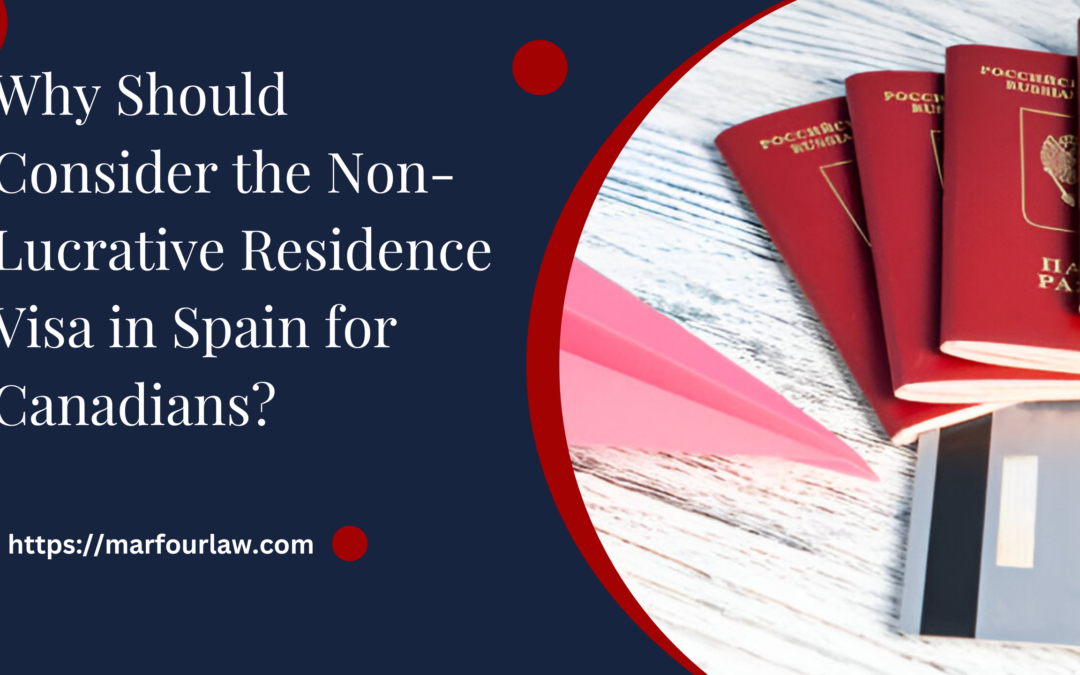The Non-Lucrative Residence Visa in Spain for Canadians is an ideal option for those wanting to enjoy life in Spain without needing to work. It provides the opportunity to live in the country for an extended period while experiencing its culture, climate, and lifestyle. In this guide, we will break down everything you need to know about the Non Lucrative Visa, including eligibility, application procedures, and frequently asked questions. Whether you’re thinking of moving to Spain long-term or for a specific period, this guide will walk you through the essential steps to get started.
What Is the Non-Lucrative Residence Visa in Spain for Canadians?
If you’re a Canadian considering a move to Spain, the Non-Lucrative Residence Visa might just be the perfect fit for you. This visa allows you to live in Spain without engaging in any work activities, making it ideal for retirees or individuals with independent financial means. Let’s break down what you need to know about this visa, including eligibility requirements, application procedures, and benefits.
Overview of the Non-Lucrative Visa
The Non-Lucrative Residence Visa is designed for non-EU citizens who want to reside in Spain without working. It allows holders to live in the country for an extended period while enjoying all that Spain has to offer, from its rich culture and stunning landscapes to its excellent healthcare and quality of life. This visa is particularly appealing to Canadians looking for a new lifestyle or a warmer climate.
Eligibility Requirements
To qualify for the Non-Lucrative Residence Visa, you must meet specific requirements:
- Financial Stability: You need to demonstrate sufficient financial resources to support yourself without working in Spain. The amount required varies, but generally, you must show you have at least €27,115 per year for the main applicant, plus an additional €6,778 for each dependent family member.
- Health Insurance: You must have valid private health insurance coverage that meets the requirements of the Spanish healthcare system. This insurance should cover all potential medical expenses during your stay in Spain.
- Clean Criminal Record: You’ll need to provide a criminal record certificate from Canada or any country where you have lived in the last five years. This certificate should show that you do not have any serious criminal convictions.
- Medical Certificate: A medical certificate stating that you do not have any contagious diseases is also required. This document should be issued by a licensed healthcare provider.
- No Prior Residency Violations: You must not have violated any residency laws in Spain or any other Schengen country in the past.
Application Process
Applying for the Non-Lucrative Residence Visa involves several steps:
- Gather Required Documents: Compile all necessary documents, including proof of financial resources, health insurance, criminal record certificate, medical certificate, and a completed visa application form.
- Submit Your Application: Applications must be submitted to the nearest Spanish consulate or embassy in Canada. Make sure to check for any specific requirements or forms that may vary by location.
- Pay the Application Fee: There is usually a fee associated with the visa application, which can vary. Be prepared to pay this fee upon submission.
- Wait for Processing: Visa processing times can vary, so it’s essential to apply well in advance of your intended move. It typically takes a few weeks to a couple of months for your application to be processed.
- Receive Your Visa: Once your application is approved, you will receive your Non-Lucrative Residence Visa, allowing you to enter Spain and begin your new life.
Validity and Renewal
The Non-Lucrative Residence Visa is initially valid for one year. After this period, you can apply for a renewal, which is usually granted for two additional years. After five years of legal residency in Spain, you may be eligible to apply for permanent residency.
Benefits of the Non-Lucrative Visa
The Non-Lucrative Residence Visa offers several advantages:
- Long-Term Residency: This visa allows you to reside in Spain for an extended period without the need to work.
- Travel Freedom: With this visa, you can travel freely within the Schengen Area for short stays, making it easier to explore neighboring countries.
- Access to Healthcare: As a resident in Spain, you’ll have access to the public healthcare system, provided you have valid health insurance.
- Quality of Life: Spain is known for its excellent quality of life, vibrant culture, and beautiful weather, making it an attractive place to live.
The Non-Lucrative Residence Visa is an excellent option for Canadians looking to live in Spain without the pressures of employment. With the right financial resources and preparation, you can enjoy all that this beautiful country has to offer. At Marfour International Law Firm, we’re here to assist you with the application process and answer any questions you may have about relocating to Spain. Your new adventure awaits!
How Long Can I Stay in Spain with the Non-Lucrative Visa?
If you’re considering relocating to Spain and applying for the Non-Lucrative Visa, you’re likely curious about how long you can stay. This visa offers a fantastic opportunity to enjoy all that Spain has to offer without the need to work. Let’s explore the duration of the Non-Lucrative Visa and what it means for your time in Spain.

Initial Duration of Stay
When you first obtain the Non-Lucrative Visa, it is typically granted for one year. This initial visa allows you to reside in Spain for up to 12 months without engaging in any work activities. It’s essential to keep in mind that this visa is non-renewable in the sense that you cannot simply reapply for another one-year visa once it expires. Instead, you must apply for an extension if you wish to continue living in Spain.
Renewal of the Non-Lucrative Visa
After your first year, you can apply for a renewal of your Non-Lucrative Visa. The renewal is generally granted for two additional years. To successfully renew your visa, you’ll need to meet the same eligibility requirements as your initial application, such as demonstrating ongoing financial stability and maintaining valid health insurance. This means that your residency in Spain can be extended for a total of three years if you receive the initial visa and successfully renew it once.
Path to Permanent Residency
Once you have lived in Spain for five years with a valid Non-Lucrative Visa, you may be eligible to apply for permanent residency. This is a significant milestone because it grants you the right to live in Spain indefinitely. However, you will need to fulfill specific requirements for this application, including maintaining your financial stability and health insurance.
Travel and Stay Restrictions
While the Non-Lucrative Visa allows you to reside in Spain, it’s important to be aware of the Schengen Area rules. With this visa, you can travel freely within the Schengen countries for short stays (up to 90 days within a 180-day period). However, these short trips should not disrupt your primary residency in Spain. Spending too much time outside of Spain could raise questions about your residency status, so it’s essential to keep your primary residence in Spain during your time there.
Understanding the duration and renewal process can help you plan your move and enjoy your new life in this beautiful country. At Marfour International Law Firm, we’re here to assist you with every step of your journey to Spain, ensuring a smooth transition to your new home.
Canada Golden Visa vs Non Lucrative Visa | What’s the Difference
If you’re considering a move to Europe, you might be weighing your options between the Canada Golden Visa and Spain’s Non-Lucrative Visa. While both are excellent pathways for obtaining residency, they differ significantly in their requirements, benefits, and overall purpose. Let’s break down these two visas to help you understand which option may be better for you.

Purpose of the Visas
The Canada Golden Visa primarily aims to attract foreign investors who can contribute to the Canadian economy. By investing a significant amount in Canadian businesses or real estate, you can gain residency for yourself and your family. This visa promotes business development and job creation in Canada, making it a popular choice for those looking to invest.
On the other hand, the Non-Lucrative Visa in Spain is designed for individuals who wish to live in Spain without engaging in any work activities. This visa is ideal for retirees, remote workers, or anyone with independent financial means who wants to enjoy the Spanish lifestyle without the pressure of employment.
Eligibility Requirements
The eligibility criteria for these two visas vary significantly. For the Canada Golden Visa, you typically need to make a considerable financial investment. This investment can take various forms, such as purchasing property, starting a business, or contributing to government-approved funds. The required investment amount can be substantial, often exceeding CAD 200,000, depending on the specific program you choose.
In contrast, the Non-Lucrative Visa requires you to demonstrate financial stability but does not demand a specific investment. Instead, you must show proof of sufficient funds to support yourself and any dependents. The annual income requirement is around €27,115 for the main applicant, plus additional funds for dependents. You also need valid health insurance and a clean criminal record to qualify.
Duration of Stay
When it comes to duration, the Canada Golden Visa offers flexibility based on your investment. Once granted, the visa can lead to permanent residency and eventual citizenship after meeting specific residency requirements. It does not have a fixed duration like the Non-Lucrative Visa, which is valid for one year initially and can be renewed for two additional years. After five years of legal residency in Spain, you may apply for permanent residency.
Work and Travel Opportunities
Another critical difference lies in work and travel opportunities. With the Canada Golden Visa, you can engage in business activities related to your investment. This option can be appealing if you’re looking to develop a business or invest actively in Canada.
In contrast, the Non-Lucrative Visa prohibits holders from working in Spain. You can live in Spain and travel within the Schengen Area, but you cannot engage in any work-related activities. This limitation may make it less attractive for individuals who want to maintain an active professional life.
Healthcare Access and Quality of Life
Both countries offer excellent healthcare systems, but the access you have can differ. As a Golden Visa holder in Canada, you may need to ensure you have private health insurance until you qualify for provincial health coverage, which varies by province. In Spain, however, as a Non-Lucrative Visa holder, you can access the public healthcare system as long as you maintain valid health insurance.
Choosing between the Canada Golden Visa and the Non-Lucrative Visa in Spain ultimately depends on your personal goals, financial situation, and lifestyle preferences. If you are looking to invest and actively engage in business, the Golden Visa might be the way to go. However, if you prefer a peaceful life in Spain without the need to work, the Non-Lucrative Visa could be your best option. At Marfour International Law Firm, we’re here to guide you through the process and help you make an informed decision about your residency options.
Can You Stay in Spain for Six Months Without a Visa
If you’re considering a trip to Spain, you might wonder whether it’s possible to stay for six months without needing a visa. This question is crucial for anyone planning to spend an extended period in the country. Let’s break down the details to clarify your options and the rules you need to follow.
Visa-Free Stay for Short Visits
Spain is a member of the Schengen Area, which allows for visa-free travel for citizens of certain countries, including Canada and the United States. If you’re from one of these countries, you can enter Spain as a tourist without a visa for up to 90 days within a 180-day period. This means you can enjoy the sights, culture, and food without any additional paperwork for short stays.
However, spending six months in Spain without a visa falls outside these guidelines. The 90-day limit applies to any Schengen Area country, so if you’re planning to stay longer, you’ll need to explore other options.
Options for Staying Longer
If you want to spend six months in Spain, you will need to obtain a visa that allows for a longer stay. There are several visa options available depending on your circumstances:
- Non-Lucrative Visa: This visa allows you to reside in Spain for an extended period without engaging in any work activities. It is ideal for retirees, remote workers, or individuals with sufficient financial means. Initially, this visa is granted for one year and can be renewed.
- Work Visa: If you plan to work in Spain, you’ll need a work visa. This typically requires a job offer from a Spanish employer, who will need to sponsor your application.
- Student Visa: If your primary purpose for being in Spain is to study, you can apply for a student visa. This visa allows you to stay in the country for the duration of your studies.
- Family Reunification Visa: If you have family members who are Spanish citizens or legal residents, you may qualify for a family reunification visa.
Consequences of Overstaying
Staying in Spain for longer than the allowed 90 days without a visa can lead to serious consequences. If you overstay your visa-free period, you may face fines, deportation, and even bans on re-entering the Schengen Area. It’s essential to adhere to the rules to avoid complications.
In summary, you cannot stay in Spain for six months without a visa if you’re entering under the Schengen visa waiver. The maximum stay allowed is 90 days within a 180-day period. If you wish to stay longer, consider applying for a suitable visa that meets your needs. At Marfour International Law Firm, we’re here to assist you in understanding the visa process and help you find the best option for your stay in Spain.
Key Benefits of the Non Lucrative Visa for Canadians
If you’re a Canadian considering a move to Spain, the Non-Lucrative Visa offers a great opportunity to enjoy life in one of Europe’s most vibrant countries. This visa allows you to reside in Spain without the need to engage in any work activities. Let’s explore the key benefits that make this visa an attractive option for Canadians.

Enjoy a High Quality of Life
Spain is renowned for its high quality of life, offering a unique blend of rich culture, stunning landscapes, and a relaxed lifestyle. With the Non-Lucrative Visa, Canadians can immerse themselves in the Spanish way of life, enjoying everything from delicious cuisine to vibrant festivals and beautiful beaches. Whether you’re sipping coffee in a charming café or exploring historic towns, living in Spain can provide an enriching experience.
Access to Public Healthcare
One of the significant advantages of the Non-Lucrative Visa is access to Spain’s excellent public healthcare system. Once you obtain the visa, you can enroll in the public health insurance system, which offers a wide range of services at low or no cost. This access to quality healthcare can provide peace of mind, knowing that you’re covered in case of any medical needs.
Flexibility to Travel in Europe
Having a Non-Lucrative Visa allows you to reside in Spain, and it opens the door to travel throughout the Schengen Area. You can freely explore other European countries for short stays without needing additional visas. This flexibility makes it easier to experience the diverse cultures, landscapes, and histories that Europe has to offer.
Pathway to Permanent Residency
The Non-Lucrative Visa can be a stepping stone toward permanent residency in Spain. After living in the country for five years with this visa, you may be eligible to apply for permanent residency. This status grants you the right to live in Spain indefinitely, providing long-term stability and security for you and your family.
Live Without Employment Constraints
One of the standout features of the Non-Lucrative Visa is that it allows you to live in Spain without the pressure of employment. If you’re a retiree or someone with independent financial means, this visa is perfect for enjoying your time without the obligations of a job. You can spend your days pursuing hobbies, traveling, or simply relaxing in the Spanish sun.
A Safe and Welcoming Environment
Spain is known for its friendly and welcoming culture. Canadians often find it easy to integrate into Spanish society, thanks to the openness of the locals. Additionally, Spain is generally considered a safe country with a low crime rate, making it an appealing destination for families and individuals alike.
In summary, the Non-Lucrative Visa offers numerous benefits for Canadians looking to live in Spain. From enjoying a high quality of life and accessing public healthcare to the flexibility of traveling across Europe, this visa provides a fantastic opportunity to embrace a new lifestyle. At Marfour International Law Firm, we’re here to help you navigate the process and ensure a smooth transition to your new home in Spain.
FAQs
Here are some frequently asked questions (FAQs) related to the Non Lucrative Residence Visa in Spain for Canadians:
Can I work in Spain with a Non Lucrative Residence Visa?
No, the Non Lucrative Residence Visa does not allow you to work or engage in any professional activities in Spain. It is strictly for those who can support themselves financially without employment. If you’re looking to work in Spain, you may need to explore other visa options.
How long can I stay in Spain without a visa?
Canadians can stay in Spain for up to 90 days within a 180-day period without a visa. If you wish to stay longer, such as for 6 months or more, you will need a visa, like the Non Lucrative Residence Visa, which grants an initial one-year stay.
What is the difference between the Canada Golden Visa and the Non Lucrative Residence Visa?
The Canada Golden Visa is based on making an investment, usually in real estate, while the Non Lucrative Residence Visa has no investment requirement. The latter only requires that you prove you have sufficient funds to support yourself during your stay.
Can I extend my Non Lucrative Residence Visa after the first year?
Yes, the Non Lucrative Residence Visa can be renewed after the first year for another two years. After that, you can continue renewing it, and after five years, you may become eligible for permanent residency.
Conclusion
The Non Lucrative Residence Visa in Spain for Canadians opens the door to a lifestyle filled with cultural experiences, travel, and relaxation. By ensuring you meet the financial requirements, submit the correct paperwork, and plan for health insurance and taxes, you can enjoy all that Spain has to offer. Whether you’re looking for a temporary change or a more permanent move, this visa gives you the flexibility to experience life in Spain on your own terms.

